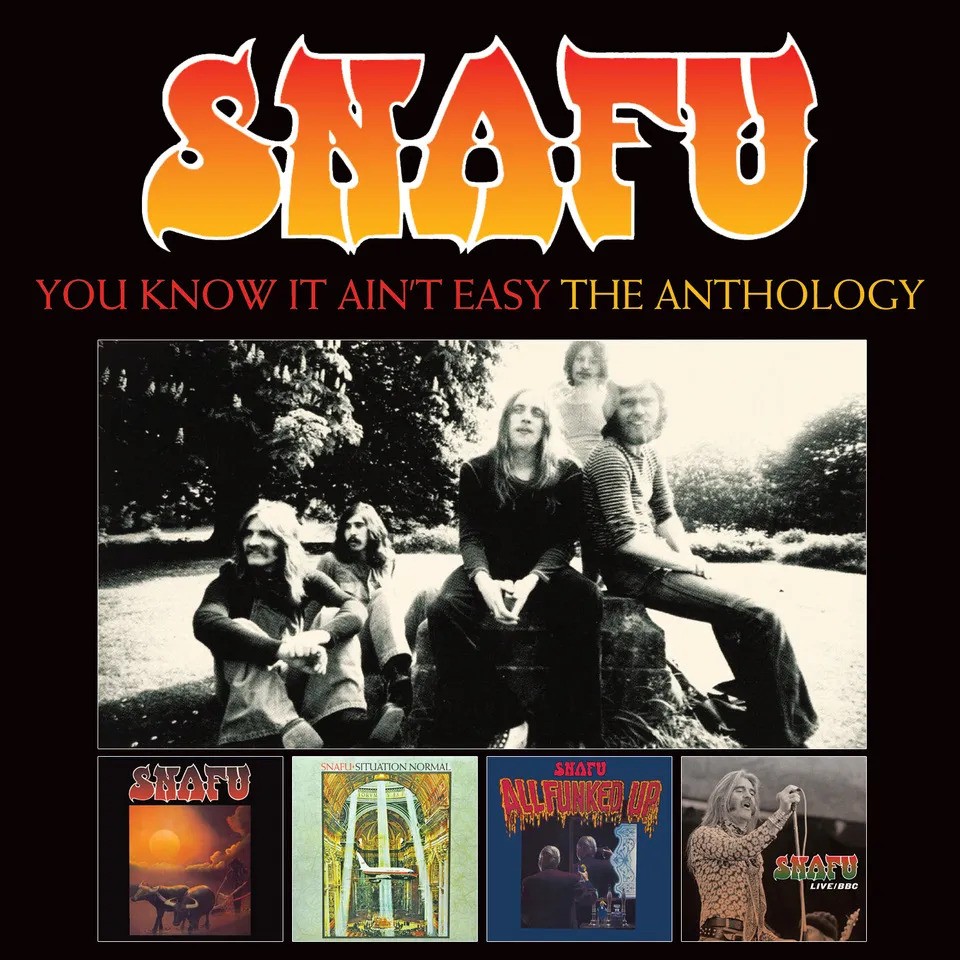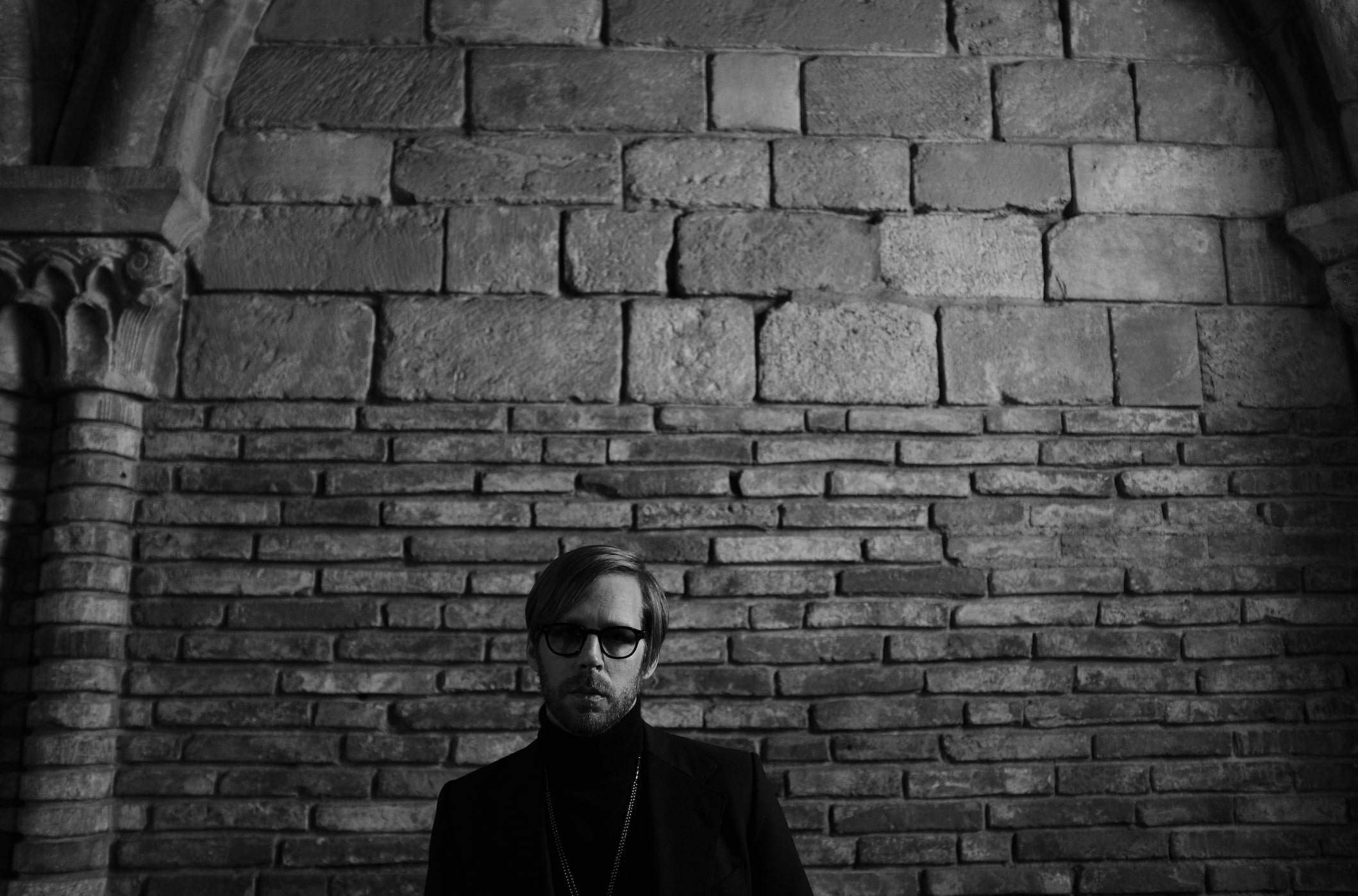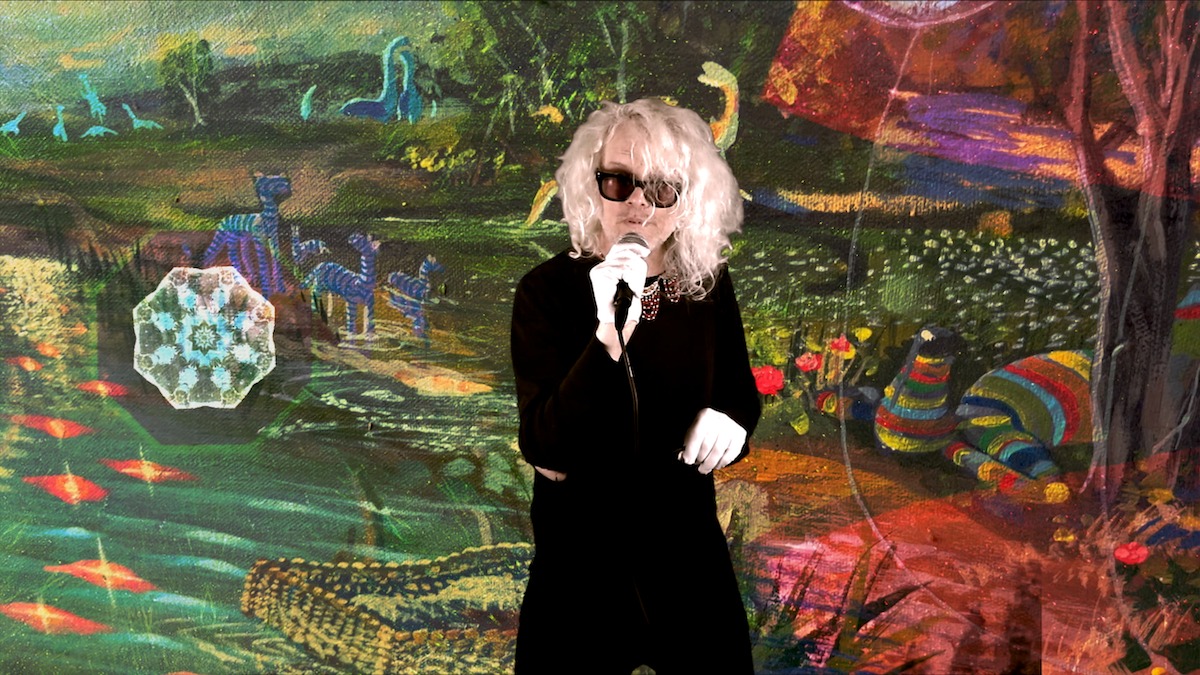Snafu – ‘You Know It Ain’t Easy’ (2024)
The inaugural comprehensive anthology of the acclaimed early 70s British rock band, featuring Micky Moody before his Whitesnake days and former Freedom vocalist Bobby Harrison.
When bands gather for photo shoots the result is usually a serious set of individuals wishing to radiate focus or mystery, a nervous grin or two, but Snafu are always laughing not just smiling as if reflecting their music. Here is the first complete anthology of known recordings by Snafu, a versatile short-lived English quintet tipped as contenders.
The early 70s was an era of great originality of course, those forging a niche and developing their own way usually found success. Snafu seamlessly played authentic hard or prog rock, blues, country, funk, r’n’b even southern boogie when compared to Lynyrd Skynyrd, Steve Miller, Iron Butterfly, Little Feat, or British groups Kokomo and Average White Band, but if it couldn’t be easily pigeon-holed by the powerful music media then it may not transmit to vinyl sales, despite pedigree and hard gigging.
Yet their whole career from early ’73 saw dizzy heights just around the corner as ex-members of Procol Harum, Ginger Baker’s Airforce, Juicy Lucy, Freedom, Skip Bifferty, Paladin and Tramline (two Island albums) among others, which I stress here more than the booklet. Almost immediately taken on by World-Wide Artists (WWA), a management agency set up by 23-year-old Patrick Meehan, ex-roadie for Gene Vincent and producer of Black Sabbath. Snafu soon caught the attention of Radio One DJs (Bob Harris, Alan Black, John Peel) when a reliable opener for tour bands and festivals like Reading or at leading London venues (Marquee, Roundhouse, Global Village debut supporting Camel).
Singer Bobby Harrison (who’d been drummer/vocalist in Freedom, also on WWA’s agency’s books) with pre-Whitesnake guitarist Mick Moody were joined by Colin Gibson on bass from Ginger Baker’s Airforce (Gibson coined the name, US military slang for Situation Normal All Fucked Up used on Capt. Beefheart’s Big Eyed Beans From Venus), like Moody from the North East where Tramline and Skip Bifferty plied their trade supporting Free, plus drummer Terry Popple (Tramline, Legend, later Van Morrison) and Pete Solley on keys/violin who’d been in the Chris Farlowe Band (with Arthur Brown and Terry Reid) and Paladin.
Moody’s first school band was The Roadrunners with bass/vocals by none other than schoolfriend Paul Rodgers, then four songs by his new Wildflowers were recorded by Paul Kossoff but the tape later disintegrated when unearthed. In 1973, their management agency briefly formed a label that had Black Sabbath, Gentle Giant, Medicine Head and Groundhogs. After Freedom, Bobby Harrison did a solo LP ‘Funklist’ featuring Matthew Fisher (Procol Harum), Sabbath’s Tony Iommi, Ian Paice(Deep Purple)and Micky Moody. The suits shelved it when heard Harrison and Moody were planning a band, coming out only in America in 1975.
Snafu went into Richard Branson’s Manor Studio (only its second LP after Mike Oldfield’s ‘Tubular Bells’; Solley briefly played on it in the next studio) and their eponymous platter was released on WWA in January 1974, the third of that brief label’s dozen releases whose owner was implicated in the Sabbath scandal. Produced by Vic Smith (Skip Bifferty, The Jam etc.) it came out in a striking Roger Dean cover, Snafu promoting it that month on BBC’s The Old Grey Whistle Test along with a radio session and Top Of The Pops transcription disc, two tracks of which are on the first CD. Support tours with the Kinks, Eagles, Doobie Brothers, ELP and Joe Cocker garnered positive reviews and full pages in influential music papers like Beat Instrumental (March), Music Week, Record Mirror, Sounds, while Melody Maker called them genuine contenders. Their strong thoughtful compositions now and again crossed to covers too.
The eight tracks were all band-composed except Gamble & Huff’s Drowning In The Sea Of Love which is more upbeat like Santana than the Top 20 hit, issued by Capitol as a promo stateside. It kicks off with a rock-funky fave from Harrison’s shelved solo platter, one of three versions here, with keening guitar solo and imaginative bass, followed by Said He The Judge’s country-fried rock with bold tempo shifts for Moody’s slide-and-wah-wah reminiscent of Juicy Lucy and late-Freedom. Country Nest revisits that savannah, looped with faux sound effects. A fiddle and what sounds like mandolin hoedown (Monday Morning), even more speeded-up on Funky Friend, might have been McGuiness Flintish surprise hits.
Goodbye USA we’re told was inspired by Steely Dan/Little Feat with pedal steel augmented by Solley’s synthesizer, almost yachters’ AOR ahead of time (issued on Vertigo in Europe) as was the next LP’s Playboy Blues with two BBC versions here. That’s The Song with faux end builds to a crescendo showcasing tight musicianship. The non-album single Dixie Queen sounds more Redbone than the title, an atmospheric brooding boogie, the longest is an unreleased Sad Sunday (no details given), an organ-fuelled sixties feel. Disc one closes with a blistering Said He The Judge and Goodbye USA for a BBC session the same month.
In the spring ‘Situation Normal’ appeared just after a US tour but alas coincided with Sabbath’s discovery that the agency-label had cooked the books, resulting in no label promotion. The second disc’s eight self-penned tracks are with a BBC ‘In Concert’ from between both albums, opener and closer from the debut plus three from the new LP which begins with a cracking bubbling solo plus keys and bells for a six-minute buzz. A rare love song of absence in their repertoire (No Bitter Taste), adorned with pedal steel, highlights that this album has more girl-centred lyrics than the debut. A fiddle/mandolin hoedown (Brown Eyed Beauty And The Blue Assed Fly), with washboard, spoons even coconuts, leads into Lock And Key with rocking master slide guitar welded to harmonies; three versions of this live favourite are here. Big Dog Lusty is bass-loaded funk with harmonica (presumably by Harrison, but there’s no information about who plays what). A whimsical tale of a one-night stand called Jessie Lee also features on the full half-hour BBC In Concert that has added harmonies and more extended wig-outs than LP versions. Album closer is a ragtime with brass showing their dexterity.
The quintet moved to Quarry Productions which had Status Quo, whom they tour-supported at the end of the year in the UK, France and later Germany, though the “squeaky clean” image and limited musical outlook didn’t appeal to their support (combined with this and popularity with audiences they were dropped as a gig opener). A euro-tour with American funksters War, along with T.V. and radio appearances, was at least more appropriate than ELP, but still had financial problems even on tour due to staff overheads etc., as recounted in the booklet. Their American label, who had reissued the UK LPs, took over for ‘All Funked Up’ in late ’75 again recorded at the Manor. Some fans think it their best.
Pete Solley left (later with Procol Harum, Clapton, Al Stewart) to be replaced by Brian Chatton who’d been in Warriors with Jon Anderson, Phil Collins’ Flaming Youth, and Jackson Heights, but also featured another keyboardist Tim Hinkley (Jody Grind etc.) who for a time shared keyboard duties though only one song by Chatton appears, a mid-paced funk standard. Harrison and Moody were still co-writing too plus new takes on Greg Allman, with a Ry Cooder twist, from 1970, a 1968 Otis Redding B-side (Hard To Handle) also covered by Tony Joe White and resembling the Grease Band, and Ed Cobb’s ballad Every Little Bit Hurts, with keys, brass and female backing vocals by Liza Strike and Viola Wills. It was a Top 20 hit in 1964 for Motown singer Brenda Holloway, covered by the Small Faces and Spencer Davis Group among others. Hard To Handle with a swampy revamp of Lock And Key (which was a single with slide/reverb flecked with harmonica Bar Room Tan) were strongly influenced by Hinkley according to Moody when the last two songs recorded. The wah-wah with other pedals of Keep On Running reminds of earlier albums, although it was a seminal Stevie Wonder song.
The sound broadened by keyboardists, brass and backing vocals, has a mellower feel that’s almost mainstream but still slick. Added are a 45 (by the Staples Singers) from 3 months later—thumping with weaving guitar and harmonies—that really should have been an infectious hit. Jessie Lee and a bubblier Playboy Blues are reprised from a BBC session a year before that made a transcription disc. A UK tour followed with Nazareth, the T.V. teeny show Supersonic alongside ELO and David Essex, and The Great British Music Festival which had a sixteen-page souvenir supplement in Sounds for the strong cast of Quo, Bad Company, Thin Lizzy, Procol Harum, Nazareth, Pretty Things, Steve Marriott etc. Different perspectives in Snafu started to cause friction. Harrison wanted a hit group like Procol Harum (he was associated with them in his home patch of Southend when still The Paramounts but elbowed out around Whiter Shade Of Pale, though he was on Matthew Fisher’s solo LP in ’73); Moody, however, wanted to be a cult underground band, as heard on the debut’s Country Nest and also Sad Sunday.
Commercial success not only eluded them but even basic survival. Moody guested on ex-Deep Purple’s David Coverdale first solo LP which sowed the seeds for Whitesnake. Clem Clempson (Humble Pie, Colosseum) declined to join—contrary to some histories—so Snafu folded, hitting Harrison hard (he moved to Iceland not long after). The fourth CD has a full BBC Peel session from the early autumn of ’75 highlighting their new album including a chain-sawing Lock And Key, plus a live LP from Nottingham of January ’76 which opened their final fortnight tour weeks before breaking up, issued only in 2017. Despite a disappointing turnout, a snarling Allman Brothers’ Don’t Keep Me Wonderin’ slots into Long Gone from their debut, Every Little Bit Hurts, the Jimmy Reed funk-soul Big Legged Woman, and two unreleased songs (Unsettled Dust and slide-fest Highway) leaving the winter fans suitably warmed.
Snafu’s career was reissued on CD at the outset of this century by a UK label, but this first box is a gem like the Freedom set a few years ago. Their name is unrelated to the great East of Eden album title of 1970 or their own varied musical styles, quite the opposite: four-hour party music even without a party. Perhaps their name is more appropriate to today?! The lack of success is a conundrum. Exclusively tapping American themes and idiom might seem a little baffling to some at the time perhaps; can anyone think of any who reciprocated, a yank stab at English or indeed foreign material? But it was an era literally of progression and transition that should have helped not hindered. One seriously energetic, timeless antidote to what we have lost.
Brian R. Banks
Snafu – ‘You Know It Ain’t Easy’ (Grapefruit/Cherry Red Records CRSEG4BOX145)




